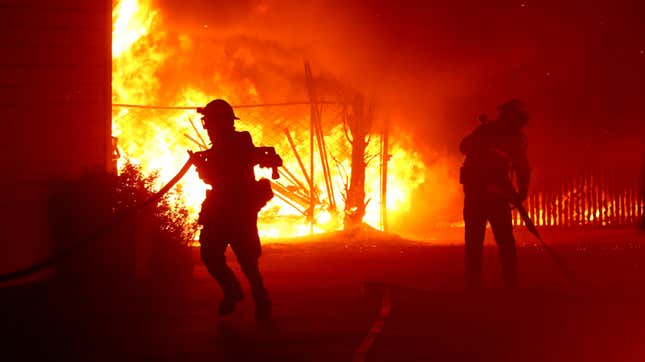Everything Burns
Latest

I can’t remember when the rains stopped. Like the wildfires, flooding in my rural California suburb was a fact of life. Our house bordered the levy that kept the river at bay, and my elementary school was perched at the bottom of the foothills in a narrow valley—the place where rain water would congregate, like the kids in rain boots who’d spend the morning splashing from one class to the next. But then, for no reason I could identify at the time, they stopped. By the time I left college, it hadn’t flooded in years.
It’s the little changes I noticed most. While I had plenty of experience driving in the rain, my little sister did not. She crashed her car her junior year, during a storm drenched Tuesday morning. Nobody was seriously injured, except, maybe, her shattered sense of how the world was supposed to work.
For my peers, our entire adult lives have been defined by this proximity to disaster, which turned the annual fire season into a full-time experience. When we are not actively running from an incoming fire, we are anxiously laughing about when the “Big One” will hit, or wondering when the Ace Hardware down the street will re-stock their air filters. The despondent pose for their weddings while fires consume the livelihoods of thousands of people in the distance. Most kids now probably don’t know what a California rainstorm feels like. Their more pressing concern is reminding their parents to pack an extra safety mask before catching the bus.
But in reality, none of this feels new. These experiences were exacerbated by the fact I grew up in the California where endless valleys hurtle up into mountains, which just as quickly drop straight into the sea. It’s also cliche to note that living in California is to live amongst disaster, as writers like Joan Didion, John McPhee and Clare Vaye Watkins have chronicled. Consider my grandparents, who’ve lived their whole lives in a cabin on one of those mountains.
My grandparents sat in this same uneasy balance: living in a teetering A-frame on the side of the Santa Cruz Mountains that’s eroding from storm-induced landslides; or burning down from fires; or occasionally having bits tumble down into the forest below after earthquakes. Large sections of my grandparents’ house fell off during the 1989 earthquake—the same earthquake which caused a rogue fire to sweep their hillside during an unusually hot October afternoon. The cabin survived, but the lesson remains: To live in California is to live on the edge of the future, but also of the world. For my grandparents, not knowing what tomorrow would bring was the only thing that could be known at all.
-

-

-

-

-

-

-

-

-

-

-

-

-

-

-

-

-

-

-

-

-

-

-

-

-

-

-

-

-

-

-

-

-

-

-

-

-

-

-

-








































